In the College of Arts and Sciences, there are always big things happening. As we prepare for another great school year, take a look at some of our highlights from summer 2017:
Chapman Center for Rural Studies
Gender, Women, and Sexuality Studies
Journalism and Mass Communications
Sociology, Anthropology and Social Work
Biology
Zhilong Yang and his lab members have been actively presenting their work at  national meeting and seminars. Four members of Yang’s lab attended the American Society for Virology Annual Meeting between June 24 and June 28 held in Madison, Wisconsin. Yang served as the convener of the Poxvirus II Workshop, while Chen Peng, a research sssociate, and Pragyesh Dhungel, a graduate student, each gave an oral presentation at the meeting. Anil Pant also presented a poster at this meeting. Yang also gave three invited seminars in July: the College of Life Sciences at Nankai University, the TEDA Institute of Biological Sciences and Biotechnology at Nankai University, and the Institute of Biophysics at the Chinese Academy of Sciences. Pictured: The Yang Lab at the 2017 Annual Meeting of American Society for Virology in Madison. From left: Chen Peng, unidentified, Anil Pant, Pragyesh Dhungel, Zhilong Yang
national meeting and seminars. Four members of Yang’s lab attended the American Society for Virology Annual Meeting between June 24 and June 28 held in Madison, Wisconsin. Yang served as the convener of the Poxvirus II Workshop, while Chen Peng, a research sssociate, and Pragyesh Dhungel, a graduate student, each gave an oral presentation at the meeting. Anil Pant also presented a poster at this meeting. Yang also gave three invited seminars in July: the College of Life Sciences at Nankai University, the TEDA Institute of Biological Sciences and Biotechnology at Nankai University, and the Institute of Biophysics at the Chinese Academy of Sciences. Pictured: The Yang Lab at the 2017 Annual Meeting of American Society for Virology in Madison. From left: Chen Peng, unidentified, Anil Pant, Pragyesh Dhungel, Zhilong Yang
Ruth Welti, University Distinguished Professor of Biology, is beginning a three-year term on the Publications Committee of the American Society of Biochemistry and Molecular Biology (ASBMB), a nonprofit scientific and educational society with more than 12,000 members. She is currently in her second five-year term as a member of the editorial board of the Journal of Biological Chemistry, one of three publications of ASBMB.
Chapman Center for Rural Studies
The Chapman Center for Rural Studies is now an interdisciplinary undergraduate research center within the K-State College of Arts and Sciences. The center had previously been housed within the college’s Department of History.
The college will form a transitional committee to explore ways in which the center can foster creative partnerships, particularly in the digital humanities. The Chapman Center currently provides undergraduates with hands-on training in professional skills such as accessioning, digital preservation and film editing.
“The Chapman Center is such a valuable resource and information hub for K-State students and our Flint Hills community,” said Arts and Sciences Dean Amit Chakrabarti. “We are glad to support its ongoing interdisciplinary work with our college and beyond.”
Center Director Bonnie Lynn-Sherow said that though the center’s organizational connection has shifted, “what will not change is the center’s focus on undergraduate research in rural studies and our commitment to off-campus engagement with rural communities.”
The center recently received a $2,000 gift from the Kansas Association of the Future Farmers of America in recognition of the work undergraduate student researchers at the center are doing about rural life in Kansas.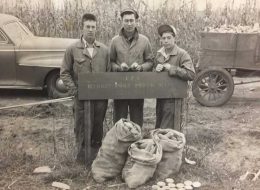
As part of this work, Katherine Sundgren, a junior in history, is digitally preserving a collection, including newspaper clippings, that documents the history of the FFA back to 1928 in preparation for the 100th anniversary of the organization.
Chapman Center director Bonnie Lynn-Sherow, associate professor of history, was first made aware of the collection in the spring and decided that it was the perfect project for a summer intern.
“The history of the FFA is integral to both the history of Kansas agriculture and Kansas State University,” Lynn-Sherow said. “The collection highlights the work of young adults dedicated to agricultural leadership and whose stories feel simultaneously foreign and intimate to our current student interns.” Read more about this project here.
English
 University Distinguished Professor Phil Nel presented a talk at Google on his forthcoming book “Was the Cat in the Hat Black?: The Hidden Racism of Children’s Literature and the Need for Diverse Books”.
University Distinguished Professor Phil Nel presented a talk at Google on his forthcoming book “Was the Cat in the Hat Black?: The Hidden Racism of Children’s Literature and the Need for Diverse Books”.
 Faculty, current graduate students, and graduate alumni gathered in Tampa in June to present at the 2017 Children’s Literature Association Conference. Pictured at right are Amy Harris Aber (MA ’11), Corinne Matthews (MA ’17), University Distinguished Professor Philip Nel, Sara Austin (MA ’12), Emily Midkiff (MA ’12), Associate Professor and Department Head Karin Westman, Mandy Moore (MA ’18), Becca Rowe (MA ’16), Associate Professor Joe Sutliff Sanders, and Ashley Christ (MA ’16). Emily Mattingly (MA ’07) and Taraneh Matloob (MA ’11) also presented but are not pictured.
Faculty, current graduate students, and graduate alumni gathered in Tampa in June to present at the 2017 Children’s Literature Association Conference. Pictured at right are Amy Harris Aber (MA ’11), Corinne Matthews (MA ’17), University Distinguished Professor Philip Nel, Sara Austin (MA ’12), Emily Midkiff (MA ’12), Associate Professor and Department Head Karin Westman, Mandy Moore (MA ’18), Becca Rowe (MA ’16), Associate Professor Joe Sutliff Sanders, and Ashley Christ (MA ’16). Emily Mattingly (MA ’07) and Taraneh Matloob (MA ’11) also presented but are not pictured.
Steffi Dippold contributed to the online journal Common-Place as one of 13 emerging early American scholars introducing a pre-1800, open-access online text. Read her essay, “‘If I had ye gift of tongue’: The Obsession with Keys in the Seventeenth Century” here.
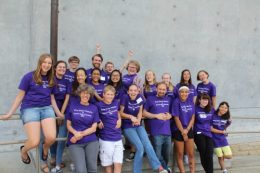 Fifteen young writers joined Associate Professor Katy Karlin and recent graduate students Kira Frank (MA ’17), Kirsten Hermreck (MA ’17), Brian McCarty (MA ’14), and Dylan Pyles (MA ’17) for the 4th annual Young Writers’ Workshop, June 26-30, at the Beach Museum of Art. Read about all five days of the workshop at the K-State Young Writers Workshop blog.
Fifteen young writers joined Associate Professor Katy Karlin and recent graduate students Kira Frank (MA ’17), Kirsten Hermreck (MA ’17), Brian McCarty (MA ’14), and Dylan Pyles (MA ’17) for the 4th annual Young Writers’ Workshop, June 26-30, at the Beach Museum of Art. Read about all five days of the workshop at the K-State Young Writers Workshop blog.
Gender, Women, and Sexuality Studies
Departmental faculty, students, alumni and friends celebrated spring graduates 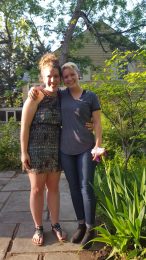 and recognized student accomplishments on May 5. Two scholarships for the 2017-18 year were awarded. Emily Polston is the winner of the Founders Scholarship for Academic Excellence in Gender, Women, and Sexuality Studies, which recognizes the rising senior with the most distinguished academic record. Polston is a GWSS major and leadership studies minor, and plans to work in the non-profit sector after graduation. Anneliese Spence is the winner of the Clarina Howard Nichols Scholarship, which was endowed by alumna Janice P. Dreiling. Spence is earning a dual degree in GWSS and Kinesiology. She said in her application for the scholarship: “I want to combine my knowledge and passions in science and medicine with the ways of knowing and thinking from GWSS in order to pursue a profession as a care giver who empowers marginalized folks in particular.”
and recognized student accomplishments on May 5. Two scholarships for the 2017-18 year were awarded. Emily Polston is the winner of the Founders Scholarship for Academic Excellence in Gender, Women, and Sexuality Studies, which recognizes the rising senior with the most distinguished academic record. Polston is a GWSS major and leadership studies minor, and plans to work in the non-profit sector after graduation. Anneliese Spence is the winner of the Clarina Howard Nichols Scholarship, which was endowed by alumna Janice P. Dreiling. Spence is earning a dual degree in GWSS and Kinesiology. She said in her application for the scholarship: “I want to combine my knowledge and passions in science and medicine with the ways of knowing and thinking from GWSS in order to pursue a profession as a care giver who empowers marginalized folks in particular.”
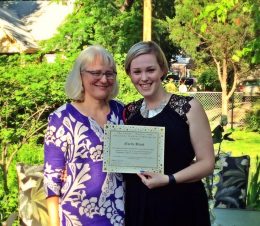 The winner of the undergraduate paper award was graduating GWSS minor Mark Nelson for his persuasive analysis of singer Nikki Minaj’s “Anaconda,” written for Dr. Valerie Padilla Carroll’s GWSS 550. Nelson argues that in this song, Minaj challenges prescriptive constructions of black female bodies to reclaim her sexuality from the voyeuristic regimes within which black female sexuality is traditionally read. Noelle Lynn Blood, who is enrolled in the graduate certificate in GWSS program, won the award for the best graduate paper, written for Dr. Greg Eiselein’s English 830. In “Solo Ride Until I Die: Paranoid Masculinity as Hegemonic Affect in G-Eazy’s ‘Me, Myself & I’,” Blood analyzes the white rapper’s “narration of a suspicious world view tied directly to masculine performance” as it “perpetuates and justifies a popular paranoid affect that permeates modern sociopolitical discourse.”
The winner of the undergraduate paper award was graduating GWSS minor Mark Nelson for his persuasive analysis of singer Nikki Minaj’s “Anaconda,” written for Dr. Valerie Padilla Carroll’s GWSS 550. Nelson argues that in this song, Minaj challenges prescriptive constructions of black female bodies to reclaim her sexuality from the voyeuristic regimes within which black female sexuality is traditionally read. Noelle Lynn Blood, who is enrolled in the graduate certificate in GWSS program, won the award for the best graduate paper, written for Dr. Greg Eiselein’s English 830. In “Solo Ride Until I Die: Paranoid Masculinity as Hegemonic Affect in G-Eazy’s ‘Me, Myself & I’,” Blood analyzes the white rapper’s “narration of a suspicious world view tied directly to masculine performance” as it “perpetuates and justifies a popular paranoid affect that permeates modern sociopolitical discourse.”
Assistant Professor Valerie Padilla Carroll presented “The Gendered Construction of Urban/Rural in Ralph Borsodi’s Flight from the City: An Experiment in Creative Living on the Land” at the 2017 Association for the Study of Literature and Environment conference in Detroit. Padilla Carroll’s paper explored how Borsodi depicts the urban and rural as sites of gender anxiety and patriarchal haven in his 1933 back-to-the-land classic, “Flight from the City.”
Associate Professor and Interim Head Angela Hubler published “It is not enough to Speak: Toward a Coalitional Consciousness in the Young Adult Rape Novel” in Children’s Literature. This essay analyzes young adult novels focused on rape by Erika Tamar, Alice Childress, Jacqueline Woodson and others, which offer a structural analysis of rape and posit the possibility of an interracial coalitional politics, in contrast to the individual focus in the majority of such novels, as exemplified by Laurie Halse Anderson’s popular and award-winning “Speak.”
Assistant Professor Harlan Weaver delivered “Lipstick on a Pitbull: Pedagogy, Queer Kinship, and Interspecies Intimacies” at the Queer Places, Practices, and Lives III conference at Ohio State University May 12-13. In June 2017, he published “Interchanges,” a piece jointly authored with Myra Hird of Queens University, Ontario in the “tranimacies: intimate links between animal and trans* studies” issue of Angelaki 22.2. The piece is a dialogue regarding the potentially productive links among Hird’s work in indigenous studies and animal studies and his own thinking on “interspecies intersectionalities” and pit bull politics.
Visiting Lecturer Angela Towne presented a poster at the 13th International Congress of Qualitative Inquiry at the University of Illinois at Urbana-Champaign Tips to Improve Data Collection on the Sensitive Topic of Sexuality. Because sexological hermeneutic interviews endeavor to gather personal information on a heavily stigmatized topic, qualitative interviews contain unique challenges. Using the example of a 2016 study conducted on the intimate phenomenon of direct clitoral stimulation during penile vaginal intercourse, Towne demonstrated simple techniques to increase participant’s comfort and engagement in interviews, encourage clarification, and successfully increase the depth of data and improve the accuracy of findings.
Geography
Climate variability — rather than the presence of a major dam — is most likely the primary cause for a water supply decline in East Asia’s largest floodplain lake system, says Jida Wang, assistant professor of geography.
The fluvial lake system across China’s Yangtze River Plain, which serves nearly half a billion people and is a World Wildlife Fund ecoregion, lost about 10 percent of its water area from 2000-2011. Wang and colleagues published their findings for the lake system’s decline in the American Geophysical Union’s journal Water Resources Research.
“Many people’s first intuition is that the culprit must be the Three Gorges Dam because it impounds so much water in the Yangtze River, but our fingerprinting study undeniably shows that the dam is not the decline’s primary cause,” Wang said. “Climate variability is the predominant driver of this decadal dynamic.”
Wang collaborated with Yongwei Sheng, of the University of California, Los Angeles, and Yoshihide Wada, of Austria’s International Institute for Applied Systems Analysis. They found that roughly 80 percent of the observed lake decline is the result of simultaneous climate variability closely related to the El Niño-Southern Oscillation, which has caused droughts and flooding in the region. Read more about the team’s findings here.
Geology
Associate Professor Amdelmoneam Raef published results of his research 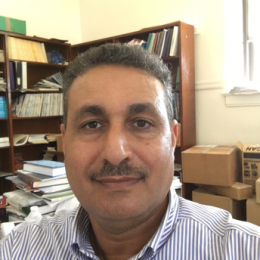 collaboration on seismic-hazard site characterization with a team from Sohag University, Egypt. The main focus of this research has been on geological and geotechnical characterization of a suggested nuclear power plant site on the Egyptian coast of the Mediterranean Sea. The site of investigation is a top candidate site for building a nuclear power plant to meet the increasing Egyptian domestic demand for electrical energy. The research was published in Soil Dynamics and Earthquake Engineering.
collaboration on seismic-hazard site characterization with a team from Sohag University, Egypt. The main focus of this research has been on geological and geotechnical characterization of a suggested nuclear power plant site on the Egyptian coast of the Mediterranean Sea. The site of investigation is a top candidate site for building a nuclear power plant to meet the increasing Egyptian domestic demand for electrical energy. The research was published in Soil Dynamics and Earthquake Engineering.
 IHS Markit approved an application from Raef for use of its Kingdom Suite geophysics software platform in the Department of Geology. This in-kind donation, worth more than $960,000, is an industry-standard in the area of exploration and development seismology. It will support teaching and research in areas of energy exploration and development, in particular seismic and petroleum geology. Pictured is three-dimensional seismic data showing a paleo-channel in pink (marked with arrows) utilizing HIS-Kingdom (Raef et al., 2015).
IHS Markit approved an application from Raef for use of its Kingdom Suite geophysics software platform in the Department of Geology. This in-kind donation, worth more than $960,000, is an industry-standard in the area of exploration and development seismology. It will support teaching and research in areas of energy exploration and development, in particular seismic and petroleum geology. Pictured is three-dimensional seismic data showing a paleo-channel in pink (marked with arrows) utilizing HIS-Kingdom (Raef et al., 2015).
Health Professions
Six K-State Pre-Med students have been named 2017 Scholars in Rural Health. The program, run through the University of Kansas School of Medicine, is an early acceptance program that guarantees students a spot in medical school when they graduate and provides mentoring and other opportunities during their undergraduate career.
The program is only available to students who are from rural Kansas who are interested in building successful careers as physicians in rural areas.
K-State’s Scholars in Rural Health are: Andrew Bruna, Life Sciences, Hanover; Riley Burghart, Biology, McPherson; Clayton Jackson, Nutritional Sciences, Cedar Point; Braden Johnson, Biology, Concordia; Katherine Rose, Biology, Hiawatha; and Natalie Sanders, Life Sciences, Hoisington.
“It’s great to see that our students are, once again, well represented in the KU Scholars in Rural Health Program,” said Kaela Urquhart, K-State health professions advisor. “We are proud of each of these students for this tremendous accomplishment. It is a testament to their hard work and the rigor of our pre-med track.”
Journalism and Mass Communications
A paper authored by faculty members Bonnie Bressers, Sam Mwangi and Steve Smethers was accepted for presentation at the 2017 national Engagement Scholarship Consortium Conference in Birmingham, Sept. 24-27. The paper, titled ‘Civically Engaged Youth: “Doing that Volunteering Stuff’ in Rural Kansas,” examines the incentives and obstacles influencing whether junior and senior high school students volunteer to produce content for the Kiowa County Media Center, a high-tech community portal intended to supplement traditional community media. The Media Center was built after a 2007 tornado devastated Greensburg, the Kiowa County seat, and demonstrated the fragility of the traditional rural media infrastructures during crises.
Music, Theatre and Dance
Slawomir Dobrzanski, professor of piano, released a CD with the Acte Préalable 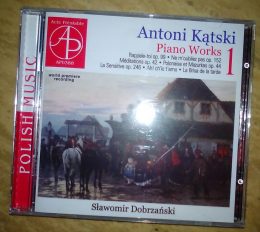 Label.The CD is the world premiere recording of the piano works of Polish composer Antoni Kątski, a Romantic composer of the 19th century.
Label.The CD is the world premiere recording of the piano works of Polish composer Antoni Kątski, a Romantic composer of the 19th century.
David Pickering, Associate Professor of Organ, toured Europe. Read more here.
Julie Pentz, associate director for dance, was elected to a three-year term as the Advisory Director of Students on the Advisory Board of Directors of the National Dance Education Organization.
Psychological Sciences
 Professor Kimberly Kirkpatrick, Professor Lester Loschky, Assistant Professor Heather Bailey, Professor Mary Cain and Assistant Professor Charles Pickens were awarded a historical $10.6 million Centers of Biomedical Research Excellence (COBRE) grant to establish the Cognitive and Neurobiological Approaches to Plasticity (C-NAP) center at K-State.
Professor Kimberly Kirkpatrick, Professor Lester Loschky, Assistant Professor Heather Bailey, Professor Mary Cain and Assistant Professor Charles Pickens were awarded a historical $10.6 million Centers of Biomedical Research Excellence (COBRE) grant to establish the Cognitive and Neurobiological Approaches to Plasticity (C-NAP) center at K-State.
The center will support cognitive, behavioral and neurobiological research as well as laboratory renovation and upgrades; faculty, postdoctoral fellow and graduate student recruitment; and professional development.
This is only the second time that Kansas State University has received a COBRE grant. Pictured, from left: Heather Bailey, Lester Loschky, Kimberly Kirkpatrick, Charles Pickens, and Mary Cain.
Sociology, Anthropology, and Social Work
Assistant Professor Marta Alfonso-Durruty published “Maize (Zea mays) consumption in the southern andes. (308–318 S. Lat): Stable isotope evidence (2000 BCE–1540 CE)” in the American Journal of Physical Anthropology. Co-authored with Andres Troncoso, Pablo Larach, Cristian Becker, and Nicole Misarti, the study assesses the timing of maize introduction, diachronic change, and synchronic dietary variability in the prehistoric semi-arid region of Northern Chile (SARNC). Results indicate that, contrary to previous archaeological understandings, the popularization of maize in the SARNC was not associated with the appearance of pottery and/or sedentism, and its role as a dietary staple was a late phenomenon.
Associate Professor Alisa Garni‘s article “Crafting Mass Dairy Production: Immigration and Community in Rural America” in Rural Sociology is now available in Wiley Early View. Focusing on three competing dairies in Kansas, Garni’s work examines how farmers variously organize work among immigrant employees to promote herd health while expanding their operations. Evidence from 22 months of ethnographic (in-depth first person observation) research and repeated interviews with farm owners, managers, employees, and extension agents suggests that enhancing production requires promoting employee citizenship at work, especially among immigrant employees possessing the fewest citizenship rights outside of work.
Return to top
Associate Professor L. Susan Williams, Professor Lorenza Lockett, and sociology graduate student John Grube recently submitted a preliminary research report to the Riley County Police Department based on early results from a quasi-experimental project testing the effectiveness and public perceptions of an officer training initiative. The project, dubbed ARC, focuses on traffic stops and accident reduction, with attention to procedural justice principles of providing voice and input to citizens. A full report is expected later this year.
Associate Professor Michael Wesch‘s video “Building the Troost Wall: Structural Racism in Kansas City” about racial segregation in Kansas City has been viewed more than a million times and will be featured in the Kansas City Star in the near future.